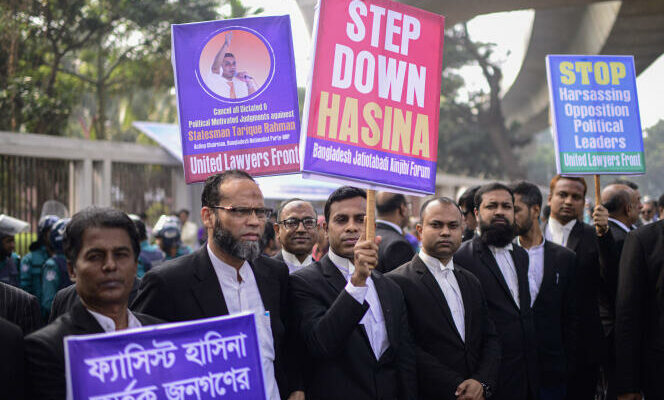The grounds of the Dhaka magistrate’s court are teeming with members of the Bangladesh Nationalist Party (BNP), the country’s main opposition party. On this Monday morning at the end of November, there are hundreds of them trampled, accused of vandalism or arson. They are waiting to be heard to obtain bail.
Rashid, a simple activist, is being prosecuted in 90 cases, Nawab in 36, Rashel has identified at least 26 complaints against him, others have simply stopped counting. The number of accused seems infinite, the list of facts with which they are accused endless. All preferred to withhold their last names for fear of police reprisals. The courts are swamped with political cases. “I no longer do anything but defend opposition activists, I can’t take it anymorebreathes Nahidul Islam, a lawyer himself a member of the BNP youth wing. And tomorrow, I too have to appear in one of the sixty cases that have been placed on my back.”.
The BNP has been demanding for months the resignation of Prime Minister Sheikh Hasina and the dissolution of Parliament in favor of a neutral interim government responsible for organizing the elections. A provision formerly provided for by the Constitution but which was repealed by Mme Hasina after coming to power. At the head of the country since 2009, she is preparing to run for a fourth consecutive term, during the legislative elections scheduled for January 7, 2024. Determined not to relinquish power, the “Asian iron lady” is leading a merciless hunt for opponents.
Rampant inflation
Daughter of Sheikh Mujibur Rahman, founding father of Bangladesh, Mme Hasina, aged 76, has pushed the country into authoritarianism. The 2014 elections, with historically low turnout, were boycotted by all opposition parties, allowing the Awami League (AL), the Prime Minister’s party, to obtain a majority and form a government. . The next election, in 2018, was marred by irregularities. “The day before the elections, the ballot boxes were stolen, stuffed and sealed”recalls Mahbub Uddin Khokon, deputy general secretary of the BNP. “During the tenure of the Awami League, no elections were held in a free and transparent manner”continues this renowned lawyer, one of the few high-flying BNP leaders to have obtained bail.
The repression against the opposition took a dramatic turn on October 28. That day, hundreds of thousands of people took to the streets of the capital at the call of the BNP to demonstrate their discontent, fueled in particular by galloping inflation of around 10%, after years of economic success attributed to to Mme Hasina. The demonstration turned into a riot and a police officer was killed. The opposition accuses the government of having orchestrated this violence with the complicity of the police to justify the turn of the screw that followed and put an end to the revolt. Awami League activists armed with wooden batons were seen walking behind police officers.
You have 60% of this article left to read. The rest is reserved for subscribers.
